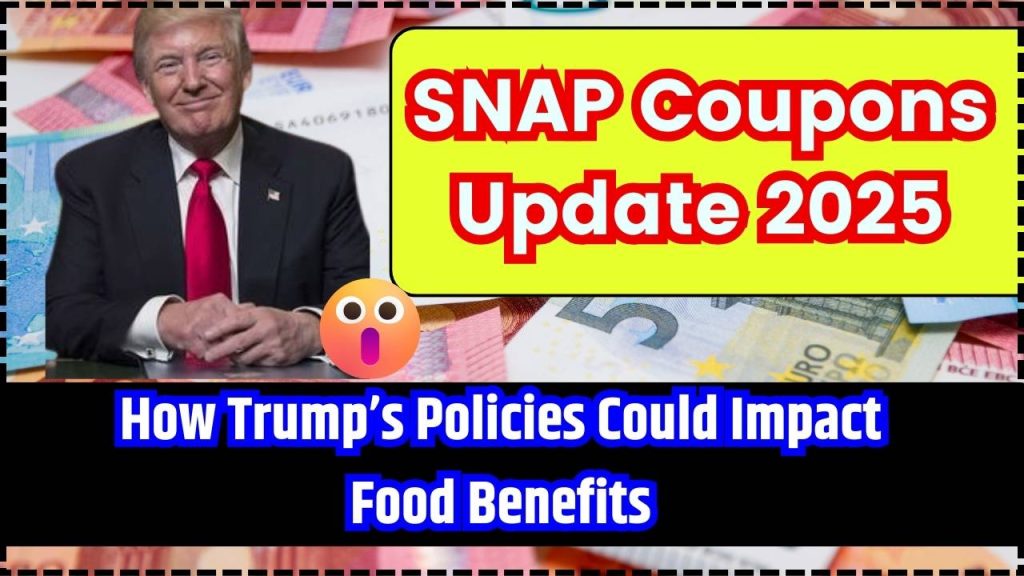
SNAP Coupons Update 2025: The Supplemental Nutrition Assistance Program (SNAP), often referred to as food stamps, serves as a critical lifeline for millions of low-income Americans. As of 2024, approximately 42.2 million people rely on SNAP benefits to meet their basic nutritional needs. However, sweeping changes proposed by President-elect Donald Trump could significantly reshape this program in 2025, affecting beneficiaries, retailers, and policymakers alike. In this article, we’ll break down these potential changes, explore their implications, and provide practical advice for navigating the evolving landscape of SNAP.
SNAP Coupons Update 2025
The proposed changes to SNAP in 2025 under Trump’s administration represent a pivotal moment for one of America’s most essential safety net programs. While the reforms aim to reduce costs and promote self-sufficiency, they also risk increasing food insecurity for millions. By staying informed and proactive, beneficiaries and stakeholders can navigate these changes and advocate for policies that balance fiscal responsibility with human dignity.
| Aspect | Details |
|---|---|
| Proposed Budget Cuts | Potential reduction of SNAP funding by nearly 30%, amounting to over $180 billion over ten years. |
| Work Requirements | Stricter work requirements for able-bodied adults without dependents, potentially impacting eligibility. |
| Program Restructuring | Possible shift of SNAP administration from USDA to HHS, altering oversight and implementation. |
| Impact on Retailers | Revenue changes expected for major retailers like Walmart and Kroger due to policy shifts. |
| Beneficiary Statistics | Approximately 42.2 million participants in 2024, with an average monthly benefit of $190.75 per person. Source |
Understanding SNAP
SNAP has a long history, beginning in the 1930s as a temporary relief measure during the Great Depression. Over time, it evolved into a permanent program aimed at combating hunger and promoting nutrition. Today, benefits are distributed via EBT cards, which recipients can use to purchase food at authorized retailers.
The program is federally funded but administered by states, ensuring that it meets the unique needs of diverse populations across the U.S.
Proposed SNAP Coupons Updates 2025 Under Trump’s Administration
- Budget Reductions: The administration has proposed cutting SNAP funding by nearly 30% over ten years, amounting to over $180 billion. This could translate into reduced benefits for recipients or stricter eligibility criteria.
- Stricter Work Requirements: Under current rules, able-bodied adults without dependents (ABAWDs) must work at least 80 hours per month to qualify for extended benefits. The proposed changes aim to expand these requirements, potentially limiting access for those unable to meet them.
- Program Restructuring: Shifting SNAP administration from the USDA to the Department of Health and Human Services (HHS) could lead to significant changes in oversight and implementation, potentially increasing administrative challenges for states.
Implications of Proposed Changes
- For Beneficiaries: Budget cuts and stricter eligibility criteria may increase food insecurity, especially for the most vulnerable populations, including children and seniors.
- For Retailers: Major grocery retailers, which depend on SNAP spending for a significant portion of their revenue, may face financial challenges due to reduced consumer purchasing power.
- For States: Administrative shifts could require states to overhaul their management systems, increasing costs and complicating service delivery.
Public Reaction
Advocates for low-income families argue that the proposed changes could exacerbate hunger and poverty, while proponents of the reforms emphasize the need for fiscal responsibility and reducing dependency on government programs. The debate reflects broader ideological divides over the role of social safety nets in America.
Practical Advice for SNAP Beneficiaries
- Stay Informed: Follow updates on SNAP policies through reliable sources like the USDA’s official website and trusted news outlets.
- Explore Community Resources: Seek additional support from local food banks and community organizations.
- Review Eligibility: Ensure compliance with work requirements and explore job training programs to meet potential new criteria.
- Plan Ahead: Adjust budgets to accommodate potential changes in benefits.
Case Study: Affected Families
Consider Maria, a single mother of two who relies on SNAP benefits to feed her children. If stricter work requirements are implemented, Maria, who works part-time while caring for her children, may struggle to meet the new criteria. Her situation highlights the challenges faced by many families balancing work, caregiving, and basic needs.
$292 Per Month Per Family Member? The Best Way to Secure Your SNAP Payments!
SNAP Benefits Are Getting a Boost in 2025 – What You Need to Know!
Food Stamp Payment Dates for December 2024 – State-Wise SNAP Schedule & Amount Details
Frequently Asked Questions (FAQs)
Q: What foods can I buy with SNAP benefits?
A: SNAP benefits can be used to purchase most grocery items, including fruits, vegetables, meats, and dairy products. However, they cannot be used for alcohol, tobacco, or hot prepared foods.
Q: How will the proposed changes affect me if I already meet work requirements?
A: If you meet the current work requirements, you may not see immediate changes, but staying informed about additional criteria is essential.
Q: Can I appeal if I lose eligibility under the new rules?
A: Yes, beneficiaries can appeal decisions through their state SNAP office. Contact your local agency for guidance.






